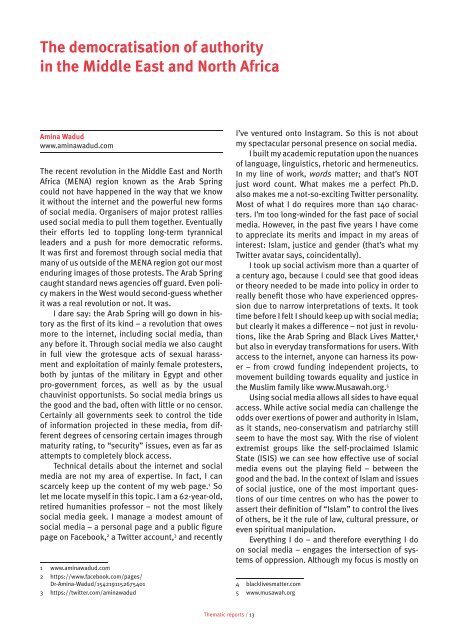Global Information Society Watch 2015
gw2015-full-report
gw2015-full-report
Create successful ePaper yourself
Turn your PDF publications into a flip-book with our unique Google optimized e-Paper software.
The democratisation of authority<br />
in the middle East and north Africa<br />
Amina Wadud<br />
www.aminawadud.com<br />
The recent revolution in the Middle East and North<br />
Africa (MENA) region known as the Arab Spring<br />
could not have happened in the way that we know<br />
it without the internet and the powerful new forms<br />
of social media. Organisers of major protest rallies<br />
used social media to pull them together. Eventually<br />
their efforts led to toppling long-term tyrannical<br />
leaders and a push for more democratic reforms.<br />
It was first and foremost through social media that<br />
many of us outside of the MENA region got our most<br />
enduring images of those protests. The Arab Spring<br />
caught standard news agencies off guard. Even policy<br />
makers in the West would second-guess whether<br />
it was a real revolution or not. It was.<br />
I dare say: the Arab Spring will go down in history<br />
as the first of its kind – a revolution that owes<br />
more to the internet, including social media, than<br />
any before it. Through social media we also caught<br />
in full view the grotesque acts of sexual harassment<br />
and exploitation of mainly female protesters,<br />
both by juntas of the military in Egypt and other<br />
pro-government forces, as well as by the usual<br />
chauvinist opportunists. So social media brings us<br />
the good and the bad, often with little or no censor.<br />
Certainly all governments seek to control the tide<br />
of information projected in these media, from different<br />
degrees of censoring certain images through<br />
maturity rating, to “security” issues, even as far as<br />
attempts to completely block access.<br />
Technical details about the internet and social<br />
media are not my area of expertise. In fact, I can<br />
scarcely keep up the content of my web page. 1 So<br />
let me locate myself in this topic. I am a 62-year-old,<br />
retired humanities professor – not the most likely<br />
social media geek. I manage a modest amount of<br />
social media – a personal page and a public figure<br />
page on Facebook, 2 a Twitter account, 3 and recently<br />
1 www.aminawadud.com<br />
2 https://www.facebook.com/pages/<br />
Dr-Amina-Wadud/1542191152675401<br />
3 https://twitter.com/aminawadud<br />
I’ve ventured onto Instagram. So this is not about<br />
my spectacular personal presence on social media.<br />
I built my academic reputation upon the nuances<br />
of language, linguistics, rhetoric and hermeneutics.<br />
In my line of work, words matter; and that’s NOT<br />
just word count. What makes me a perfect Ph.D.<br />
also makes me a not-so-exciting Twitter personality.<br />
Most of what I do requires more than 140 characters.<br />
I’m too long-winded for the fast pace of social<br />
media. However, in the past five years I have come<br />
to appreciate its merits and impact in my areas of<br />
interest: Islam, justice and gender (that’s what my<br />
Twitter avatar says, coincidentally).<br />
I took up social activism more than a quarter of<br />
a century ago, because I could see that good ideas<br />
or theory needed to be made into policy in order to<br />
really benefit those who have experienced oppression<br />
due to narrow interpretations of texts. It took<br />
time before I felt I should keep up with social media;<br />
but clearly it makes a difference – not just in revolutions,<br />
like the Arab Spring and Black Lives Matter, 4<br />
but also in everyday transformations for users. With<br />
access to the internet, anyone can harness its power<br />
– from crowd funding independent projects, to<br />
movement building towards equality and justice in<br />
the Muslim family like www.Musawah.org. 5<br />
Using social media allows all sides to have equal<br />
access. While active social media can challenge the<br />
odds over exertions of power and authority in Islam,<br />
as it stands, neo-conservatism and patriarchy still<br />
seem to have the most say. With the rise of violent<br />
extremist groups like the self-proclaimed Islamic<br />
State (ISIS) we can see how effective use of social<br />
media evens out the playing field – between the<br />
good and the bad. In the context of Islam and issues<br />
of social justice, one of the most important questions<br />
of our time centres on who has the power to<br />
assert their definition of “Islam” to control the lives<br />
of others, be it the rule of law, cultural pressure, or<br />
even spiritual manipulation.<br />
Everything I do – and therefore everything I do<br />
on social media – engages the intersection of systems<br />
of oppression. Although my focus is mostly on<br />
4 blacklivesmatter.com<br />
5 www.musawah.org<br />
Thematic reports / 13


